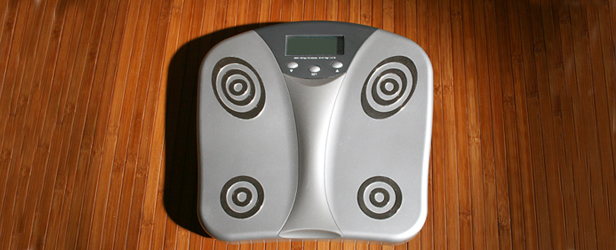
I set out twelve weeks ago with a goal in mind—to compete at the IPA Nationals in York, Pennsylvania, in the 198-pound weight class. I've never competed at any other body weight than 220 pounds and have been successful, steadily improving my total to a pro/elite level. But I wanted a new challenge. I felt that dropping weight classes and chasing another pro/elite total would provide me with both a mental and physical challenge. Needless to say, it was all of that and more.
The scale
I was aiming to drop from a body weight of 236 pounds to 198 pounds. Now, I have to say unequivocally that dropping the body weight was the easy part. I'm quite headstrong, and once I have something in my mind, I commit 100 percent. The goal was to reach a body weight of 210 pounds and then have an easy 12-pound water cut before I weighed in. The dieting was rather easy. I followed a low carb approach, with about 40 grams of carbs during the workout and post-workout in the form of a shake. I also allowed for one cheat meal every Saturday night. This worked very well, and I steadily dropped about two pounds a week until I reached a body weight of 214 pounds.
The body
A few things happen when you lose weight. The first is that your body is calorie deprived and you have much less energy. This makes training very grueling. I tried to combat this by reducing my overall training volume and using a gratuitous amount of stimulants, but after losing 22 pounds, it caught up to me. The second thing that happens when you lose weight is that your levers change. I had to bench a greater distance because I didn't have a belly. I had to change my squat stance because I was more mobile. The only lift that wasn’t drastically affected was my deadlift, but I did find myself losing my torso positioning more easily. The adage "mass moves mass" holds true! The greater the size of the body, the larger surface area the load of the bar is distributed over. Both of these factors contributed to me missing submaximal weights and actually getting weaker week by week.
The mind
When you lose weight, the mind plays tricks on you. After 22 pounds of weight loss in seven weeks, I was getting weaker and I knew it. I was missing lifts at 80 percent of my best. I started to hate training and eating the same things over and over, and it started to affect my demeanor during my everyday life. As a strength coach at a Division 1 university, this can't happen because you're the thermostat for your teams.
It was at the eight-week point when I decided to stop cutting weight and attempt to salvage my training cycle. I wasn't prepared for the steep drop in strength. I wasn't prepared for how much mental fortitude it took to overcome the lack of energy, and I wasn't prepared for my training—the activity that I use to escape from the stresses of my life—to affect me in a very negative manner.
Final reflection
Could I have pushed through and finished what I had set out to do? Absolutely. Would I have finished with a pro/elite total? I don't know. Would I have enjoyed the process and improved myself as a lifter? Absolutely not. I train because I enjoy it and because I believe that, as a strength coach, I must practice what I preach. I'm not making a living at lifting.
I do plan on competing at 198 pounds in the future at least once. However, I would give myself more time to drop the weight. Dropping 38 pounds in twelve weeks is too much too quickly, even with a large water cut (especially when you're drug-free). I would also train in a way in which I could continue to hit my numbers every week and never miss. This would ensure that I would have confidence every day that I walked into the gym. Dieting is the easy part. It's dealing with the mind that causes the most problems.
“Just remember, football is 80 percent mental and 40 percent physical.” — Little Giants









